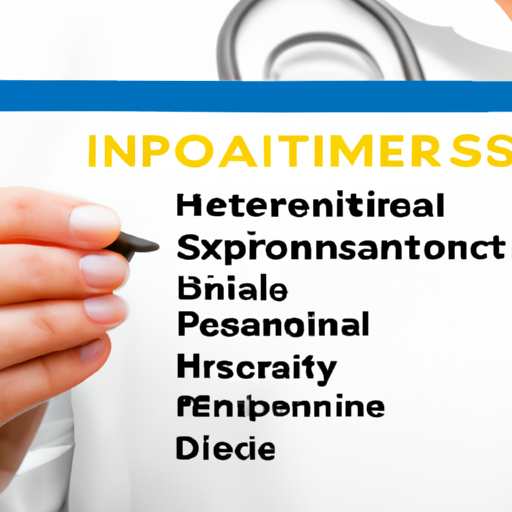Welcome to our comprehensive guide on the job description and responsibilities of a Health Informatics Specialist. In today’s fast-paced and technologically-driven healthcare field, the crucial role of these skilled professionals cannot be overstated. With a neutral tone, this article aims to provide valuable insights into the intricate world of health informatics, shedding light on the expertise and qualifications required for this demanding position. Whether you are an aspiring health informatics specialist, a healthcare professional seeking to expand your knowledge, or simply curious about this evolving field, we invite you to explore this article to delve deeper into the domain of health informatics and its intersection with the healthcare industry.
Table of Contents
- Health Informatics Specialist Job Description:
- 1. Overview of Health Informatics Specialist Role: Breaking Down the Key Responsibilities and Duties
- 2. Essential Skills and Qualifications: A Comprehensive Guide for Aspiring Health Informatics Specialists
- 3. Educational Background: Unveiling the Preferred Degrees and Certifications for a Successful Career
- 4. Understanding the Role of Health Informatics in Improving Healthcare Systems: An In-depth Analysis
- 5. Data Management and Analysis: A Deep Dive into the Crucial Responsibilities of Health Informatics Specialists
- 6. Implementing Health Information Systems: Exploring the Technical Expertise Required for Efficient Operations
- 7. Collaboration and Communication: The Vital Role of Health Informatics Specialists in Interdisciplinary Healthcare Teams
- 8. Compliance and Security: Safeguarding Electronic Health Records and Ensuring Privacy Regulations Compliance
- 9. Advancing Healthcare Quality and Patient Outcomes: The Impact of Health Informatics Specialists in the Digital Era
- To Conclude

Health Informatics Specialist Job Description:
Overview:
As a health informatics specialist, you will play a crucial role in managing and analyzing healthcare data to improve patient care and outcomes. Your expertise will bridge the gap between information technology and healthcare, ensuring that technological solutions are effective and aligned with industry standards and regulations. You will work closely with healthcare professionals, IT teams, and administrators to develop and maintain efficient electronic health record systems, data management systems, and other healthcare informatics applications.
Key Responsibilities:
- Design, implement, and maintain healthcare data systems, ensuring accuracy, security, and compliance with relevant regulations.
- Analyze healthcare data to identify patterns, trends, and insights that can be used to improve patient care and inform decision-making.
- Collaborate with cross-functional teams to develop and optimize electronic health record systems, incorporating user feedback and best practices.
- Train healthcare professionals and staff on the effective use of healthcare informatics tools and systems, ensuring their efficiency and usability.
- Stay up-to-date with industry advancements, emerging technologies, and regulatory changes to proactively propose and implement improvements to existing systems.

1. Overview of Health Informatics Specialist Role: Breaking Down the Key Responsibilities and Duties
As a Health Informatics Specialist, you play a vital role in the healthcare industry by harnessing the power of technology to improve patient care and enhance overall efficiency within healthcare systems. With a deep understanding of both healthcare operations and information systems, you contribute to the development and maintenance of advanced electronic healthcare systems, ensuring the secure and effective management of patient data.
Key responsibilities for a Health Informatics Specialist include:
- Collaborating with healthcare professionals and IT teams to design and implement electronic healthcare systems that meet the unique needs of the organization.
- Performing data analysis to identify trends, patterns, and opportunities for improvement in healthcare delivery.
- Developing and implementing protocols for the secure collection, storage, and exchange of patient information.
- Training healthcare personnel on the use of electronic health records (EHR) systems, ensuring efficient and accurate data entry.
- Evaluating and optimizing existing information systems to enhance their functionality and usability.
In this challenging yet rewarding role, your attention to detail, strong analytical skills, and ability to navigate complex healthcare regulations will be crucial. With your expertise, you will contribute to the continuous improvement of patient care delivery, while ensuring confidentiality, integrity, and availability of health information.

2. Essential Skills and Qualifications: A Comprehensive Guide for Aspiring Health Informatics Specialists
Essential Skills and Qualifications:
Aspiring health informatics specialists should possess a diverse range of skills and qualifications to excel in this field. Here is a comprehensive guide outlining the key attributes that are essential for individuals pursuing a career in health informatics:
- Strong Analytical Skills: Health informatics specialists must have a sharp analytical mind to collect, interpret, and analyze complex healthcare data. This skill is crucial for identifying trends, detecting patterns, and generating meaningful insights to improve patient outcomes.
- Technical Proficiency: Proficiency in various technical tools and software is vital in the field of health informatics. This includes familiarity with electronic health record (EHR) systems, data management software, and health information exchange protocols. A solid understanding of programming languages such as SQL and R is also highly desirable.
- Interdisciplinary Knowledge: Health informatics is a multidisciplinary field that intersects with healthcare, computer science, and information technology. Therefore, aspiring specialists should have a solid foundation in these areas to effectively bridge the gap between clinical and technical domains.
- Communication Skills: Effective communication is essential for health informatics specialists as they collaborate with various stakeholders including healthcare professionals, administrators, and IT teams. Strong written and verbal communication skills enable specialists to explain complex concepts in a clear and concise manner.
These are just a few of the essential skills and qualifications that aspiring health informatics specialists should possess. Gaining expertise in these areas will not only enhance career prospects but also contribute to the advancement of healthcare through the effective utilization of healthcare data.
3. Educational Background: Unveiling the Preferred Degrees and Certifications for a Successful Career
When it comes to pursuing a career as a health informatics specialist, there are specific educational requirements that can pave the way to a successful professional journey. While the field of health informatics encompasses a broad range of responsibilities, certain degrees and certifications are highly regarded by employers and industry experts alike. These qualifications not only provide a solid foundation in the field but also a competitive edge.
- Bachelor’s Degree in Health Informatics or a related field: A bachelor’s degree in health informatics lays the groundwork for a career in this rapidly evolving field. This degree equips individuals with an in-depth understanding of health information systems, healthcare data analysis, electronic health records management, and data privacy and security.
- Certification in Health Informatics: Obtaining a certification in health informatics demonstrates a commitment to professional excellence and enhances one’s skill set. Certifications such as the Certified Health Informatics Systems Professional or the Certified Professional in Healthcare Information and Management Systems allow individuals to showcase their expertise in managing health information systems effectively.
- Continuing Education: Given the dynamic nature of the field, health informatics specialists must stay updated with the latest advancements and best practices. Pursuing continuing education programs, such as master’s degrees or specialized workshops, helps professionals broaden their knowledge and stay abreast of emerging technologies and industry trends.
While having the right educational background is crucial, it is important to note that employers may have additional preferences based on the specific requirements of the role. Some employers may prioritize degrees in healthcare management, computer science, or data analytics, depending on the nature of the organization and the responsibilities involved. Aspiring health informatics specialists should carefully research prospective employers to understand their preferences and tailor their educational background accordingly. Overall, a strong educational foundation combined with relevant certifications and a dedication to ongoing learning is the key to unlocking a rewarding career as a health informatics specialist.
4. Understanding the Role of Health Informatics in Improving Healthcare Systems: An In-depth Analysis
Health Informatics Specialist Job Description
A health informatics specialist plays a crucial role in improving healthcare systems by utilizing their expertise in technology and data analysis. They are responsible for the management and analysis of health-related information, ensuring its accuracy, security, and accessibility. By employing their skills in data collection, organization, and interpretation, these professionals contribute to the enhancement of patient care, healthcare policies, and overall system efficiency.
The main responsibilities of a health informatics specialist include:
- Evaluating existing health information systems to identify areas for improvement
- Designing and implementing new technology solutions to enhance data collection, storage, and sharing
- Collaborating with healthcare professionals to develop and maintain streamlined communication channels
- Conducting data analysis and generating reports to identify trends, patterns, and areas for improvement within the healthcare system
- Ensuring compliance with privacy and security regulations by implementing strict protocols and training programs
- Providing technical support and training to healthcare staff, ensuring they can effectively utilize health informatics tools and systems
To succeed as a health informatics specialist, one must possess strong analytical and problem-solving skills, as well as a deep understanding of healthcare operations and technology. This role requires excellent communication skills to effectively collaborate and present findings to diverse stakeholders, including medical professionals, management teams, and policymakers. Additionally, attention to detail and the ability to work under pressure are vital, given the critical and sensitive nature of healthcare data.
5. Data Management and Analysis: A Deep Dive into the Crucial Responsibilities of Health Informatics Specialists
In the field of health informatics, data management and analysis are crucial responsibilities for specialists. These professionals play a vital role in collecting, organizing, and interpreting healthcare data, ensuring its accuracy and accessibility.
To effectively manage and analyze data, health informatics specialists employ a range of tools and techniques. They utilize specialized software and databases to store and retrieve patient information, laboratory results, and other healthcare data. By leveraging their expertise in data management systems, these specialists ensure that data is properly classified, encrypted, and secured to protect patient privacy.
To extract valuable insights from healthcare data, health informatics specialists employ analytical techniques, such as statistical analysis and data mining. They examine patterns, trends, and correlations within the data to identify potential areas for improvement in patient care and healthcare processes. By evaluating data on patient outcomes, disease prevalence, and treatment effectiveness, these specialists contribute to evidence-based decision making and support the delivery of high-quality healthcare services.
6. Implementing Health Information Systems: Exploring the Technical Expertise Required for Efficient Operations
Health informatics specialist job description
Technical Expertise
In order to efficiently implement and manage health information systems, organizations require the technical expertise of a health informatics specialist. This role entails a deep understanding of both healthcare practices and information technology systems. A health informatics specialist plays a vital role in ensuring the smooth operation of health information systems, streamlining processes, and improving overall patient care.
The main responsibilities of a health informatics specialist include:
- Assessing the healthcare needs of an organization and recommending suitable health information system solutions.
- Designing and customizing electronic health record (EHR) systems to meet the specific requirements of healthcare providers.
- Implementing and configuring health information systems, ensuring seamless integration within the existing technical infrastructure.
- Managing system upgrades, software installations, and troubleshooting technical issues to maintain optimal system performance.
- Collaborating with healthcare professionals, IT teams, and vendors to ensure effective communication and coordination between various stakeholders.
Moreover, a health informatics specialist must possess excellent analytical and problem-solving skills to identify inefficiencies within health information systems and propose innovative solutions. Proficiency in programming languages, database management, and data analytics are also essential qualifications for this role.
7. Collaboration and Communication: The Vital Role of Health Informatics Specialists in Interdisciplinary Healthcare Teams
Health informatics specialists play a vital role in interdisciplinary healthcare teams by facilitating efficient collaboration and communication. These professionals possess a unique skill set that combines knowledge of healthcare processes, information technology, and data analysis. Their primary responsibility is to leverage technology systems and electronic health records (EHRs) to manage and organize healthcare data, ensuring seamless information exchange among team members and improving patient care outcomes.
One key aspect of the health informatics specialist’s job is to design and implement interoperable health information systems. They work closely with physicians, nurses, and other healthcare professionals to understand their workflow and information needs. By leveraging their technical expertise, they develop and customize EHRs, ensuring compatibility with various devices and platforms. Additionally, health informatics specialists play a crucial role in training team members on how to effectively utilize these systems, thereby enhancing overall efficiency and reducing errors. They also collaborate with IT departments to ensure the security and privacy of patient information, keeping up with evolving regulations and best practices in data protection.
- Facilitating collaboration and communication among healthcare team members.
- Managing and organizing healthcare data using technology systems.
- Designing and implementing interoperable health information systems.
- Customizing electronic health records for compatibility with various devices and platforms.
- Training healthcare professionals on effective utilization of these systems.
- Collaborating with IT departments for data security and privacy.
8. Compliance and Security: Safeguarding Electronic Health Records and Ensuring Privacy Regulations Compliance
Compliance and Security: Safeguarding Electronic Health Records
Ensuring the utmost security and compliance of electronic health records (EHRs) is a critical responsibility within the realm of health informatics. As a health informatics specialist, you will play a vital role in safeguarding the privacy and confidentiality of sensitive patient information. Your expertise will be pivotal in implementing and maintaining robust security protocols that adhere to privacy regulations and industry best practices.
Key responsibilities in this realm include:
-Unwavering commitment to protecting patient privacy and maintaining the confidentiality of EHRs.
-Developing and implementing stringent security measures to safeguard against unauthorized access or breaches.
-Conducting regular audits and risk assessments to identify vulnerabilities and proactively address them.
-Educating and training staff on security protocols and privacy regulations to ensure compliance across the organization.
-Collaborating with IT professionals to ensure secure storage, transmission, and retrieval of EHRs.
-Staying up to date with evolving privacy laws and regulations, and advising on necessary changes to policies and procedures.
Your dedication to compliance and security will contribute to maintaining the trust and confidence of patients, healthcare providers, and regulatory bodies alike. As a health informatics specialist, your critical eye for detail and passion for protecting sensitive information will help shape the future of secure and privacy-compliant electronic health records.
9. Advancing Healthcare Quality and Patient Outcomes: The Impact of Health Informatics Specialists in the Digital Era
Health Informatics Specialist Job Description
Health informatics specialists are professionals who play a crucial role in advancing healthcare quality and improving patient outcomes in the digital era. With their expertise in both healthcare and information technology, these specialists are responsible for managing and analyzing vast amounts of health-related data to identify trends, enhance clinical decision-making, and drive innovation.
The main responsibilities of a health informatics specialist include:
- Collaborating with healthcare professionals and IT teams to design, implement, and maintain electronic health record (EHR) systems, ensuring the seamless flow of patient information.
- Developing and implementing data collection processes to capture relevant health information from various sources, such as medical devices, patient surveys, and clinical trials.
- Analyzing health data using statistical tools and techniques to identify patterns, trends, and insights that can inform evidence-based healthcare practices and improve patient outcomes.
- Ensuring data privacy and security by adhering to industry standards and regulations, managing access control, and implementing encryption and firewalls.
- Educating healthcare professionals on the effective use of health information systems and technologies to enhance their decision-making abilities and improve patient care.
A successful health informatics specialist possesses strong analytical skills, deep knowledge of healthcare processes and terminology, and proficiency in various information systems, databases, and programming languages. They must also stay up to date with the latest developments in health informatics and regulations to effectively leverage technology and drive positive changes in the healthcare industry.
To Conclude
In conclusion, the role of a health informatics specialist is pivotal in the ever-evolving healthcare industry. As outlined in this article, their responsibilities encompass a wide range of tasks that involve leveraging technology and data to improve patient outcomes, streamline healthcare processes, and ensure the confidentiality and integrity of information. The expertise of these specialists in analyzing, designing, and implementing health information systems, as well as their ability to collaborate with healthcare professionals, make them invaluable assets in driving innovation and transforming the way healthcare is delivered. As the demand for skilled health informatics professionals continues to rise, pursuing a career in this field presents immense opportunities for those with a passion for merging healthcare and technology. By understanding the job description and the crucial role they play, individuals can embark on a rewarding journey towards shaping the future of healthcare.
